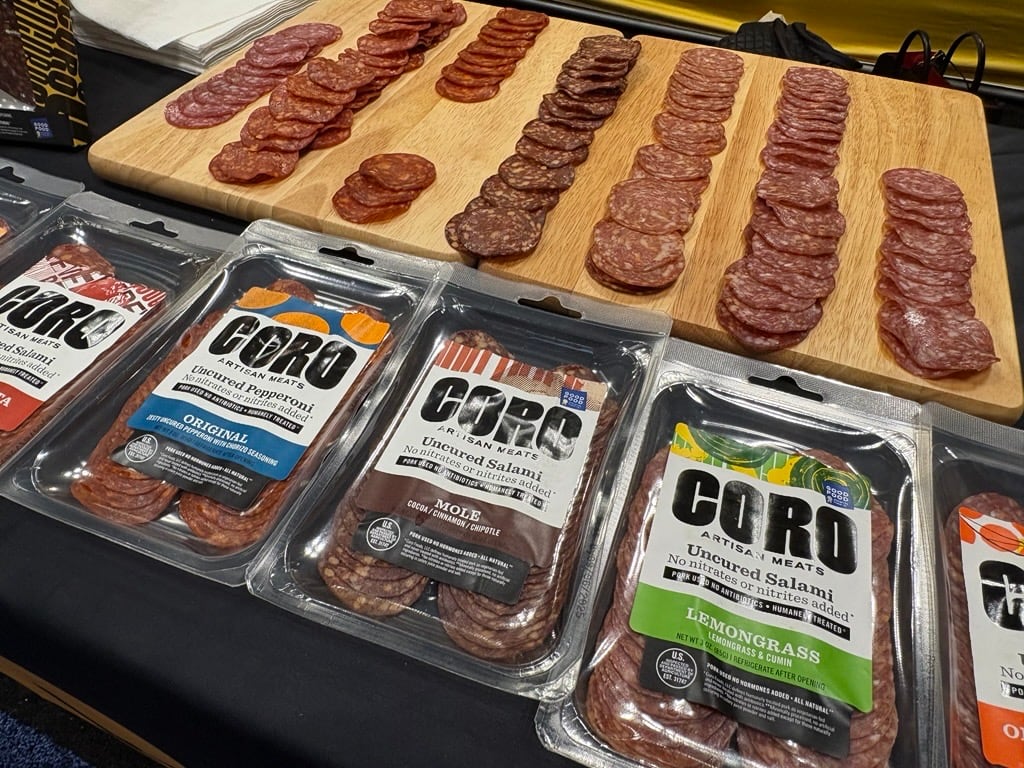Founded by the team behind Salumi Deli in Seattle, Wash., Coro Foods is a women-owned company with ambitions to disrupt the cured meat aisle with modern flavors, ethical sourcing and a design-forward aesthetic, Sherri Sparaga, head of sales at Coro Foods, said during the Summer Fancy Food Show in New York City.
“We market ourselves saying we’re not like another Genoa salami. From pork to plate, we’re completely different,” Sparaga said.
Coro’s Founders Clara Veniard and Martinique Grigg, developed the concept inside Salumi Deli, where popular sandwiches helped test early flavor profiles for the charcuterie line.
“Everything was sold in the deli, behind the counter, before it was packaged,” Sparaga said. A bestseller – the mole salami sandwich made with – later became the inspiration for one of Coro’s most distinctive products, Mole salami, she added.
Rethinking the charcuterie category
Coro’s approach blends better-for-you claims (nitrate-free and hormone-free) with culinary creativity, Sparaga explained. All meats are sourced from US family farms and processed in-house.
The animals are “treated extremely well – all the right bedding – and everything is done in-house. The meats are dried in-house. Everything,” Sparaga emphasized.
While many cured meat brands lean on traditional recipes, Coro leans heavily into flavor experimentation, with SKUs that include Orange Cardamom, Lemongrass and Mole (soon to be renamed “Chipotle and Cocoa” to improve shelf recognition, Sparaga adds), which exhibits notes of cinnamon and clove and smoky chili heat, along with subtle chocolate tones.
Channel strategy and retail expansion
After proving strong velocity in Pacific Northwest through banners like Fred Meyer, QFC, PCC Community Markets and Metropolitan Market, Coro secured broader placement in national and regional retailers. The company now sells in 220 Target locations, Fresh Thyme, MOM’s Organic Market and has begun rolling out seasonally in Publix, Sparaga detailed.
By mid-September, Coro will be available in Kroger nationwide – a significant milestone, Sparaga notes.
“Everything rides on this, because we have to show that we can succeed outside Seattle,” she said. “We’re now sitting on shelves in Utah and Arizona and Los Angeles, and we’re moving as well, if not better, than at home.”
Direct-to-consumer sales and foodservice collaborations are part of the strategy, with growing interest from independent retailers and specialty distributors, she added.
Learning to meet consumers on the shelf
Like many emerging brands, Coro adjusted its language and positioning to help shoppers navigate unfamiliar flavors or ingredients. While the Mole salami performed well in demos and tastings, it did not move as quickly on shelf.
“When you sit in front of someone and educate them, they like the mole the best,” said Sparaga. “But when you get to the shelf, the word ‘mole’ hasn’t resonated.”
The solution? Rename the product Chipotle and Cocoa to better reflect its Mexican-inspired flavor notes, she added.
Coro also supports merchandising with pairing recommendations, such as Syrah and dates with the mole salami, to help retailers build basket size and inspire charcuterie-curious shoppers, Saraga explained.



